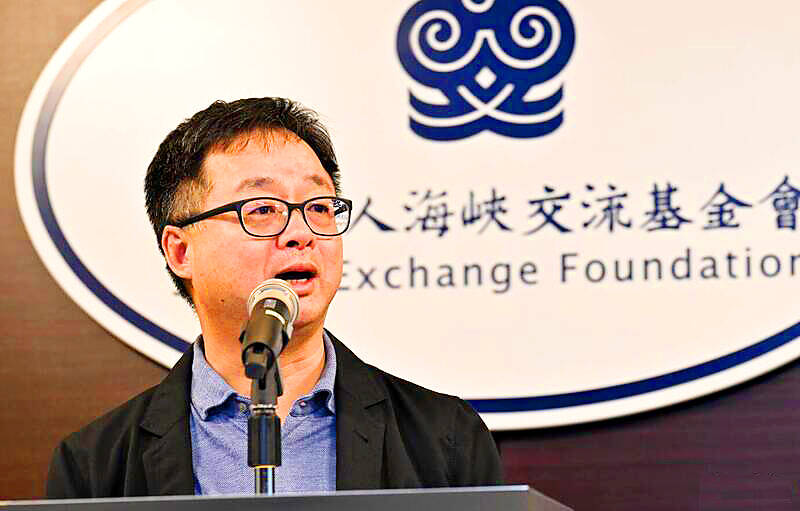The Straits Exchange Foundation (SEF) yesterday advised Taiwanese traveling to China to be careful when taking photos, as specific postures and positions could send messages that could lead to their arrest by Chinese authorities.
Starting in July, public security or national security officials can inspect or confiscate anyone’s phones or electronic devices after the official shows proof of their identity, SEF Secretary-General Luo Wen-chia (羅文嘉) said.
Taiwanese traveling to China, whether for pleasure or business, would inevitably take photos, and they must be careful that their photos do not contravene regulations as dictated by the Chinese Ministry of State Security.

Photo: Chung Li-hua, Taipei Times
The ministry’s official WeChat account said that travelers could be detained if their photos express three types of information, including geographical information, were taken near sensitive areas, or facilities of critical infrastructure or scientific research, or exposed certain documents, indexes or design blueprints.
Luo cited as a warning the Taiwanese youth who was arrested last month and detained for three days after posing at Tiananmen Square.
The Taiwanese made a “V” sign that covered some Chinese characters on the entrance to the Forbidden City, making it appear to say “Long Live the Republic of China” (中華民國萬歲) rather than “Long Live the People’s Republic of China” (中華人民共和國萬歲), Luo said.
There was also an influx of fake down jackets being sold in China, which use recycled feathers from badminton shuttlecocks, Luo said, adding that the jackets not only fail to keep the wearer warm, but they might also poison or cause an allergic reaction.
Some feminine products sold in China also had high residual amounts of formaldehyde, and some even contained insect eggs, he cited media reports as saying.
Luo urged Taiwanese to pay attention to the original production area of down jackets and feminine products, and to refrain from purchasing such items online.

The manufacture of the remaining 28 M1A2T Abrams tanks Taiwan purchased from the US has recently been completed, and they are expected to be delivered within the next one to two months, a source said yesterday. The Ministry of National Defense is arranging cargo ships to transport the tanks to Taiwan as soon as possible, said the source, who is familiar with the matter. The estimated arrival time ranges from late this month to early next month, the source said. The 28 Abrams tanks make up the third and final batch of a total of 108 tanks, valued at about NT$40.5 billion

A group from the Taiwanese Designers in Australia association yesterday represented Taiwan at the Midsumma Pride March in Melbourne. The march, held in the St. Kilda suburb, is the city’s largest LGBTQIA+ parade and the flagship event of the annual Midsumma Festival. It attracted more than 45,000 spectators who supported the 400 groups and 10,000 marchers that participated this year, the association said. Taiwanese Designers said they organized a team to march for Taiwan this year, joining politicians, government agencies, professionals and community organizations in showing support for LGBTQIA+ people and diverse communities. As the first country in Asia to legalize same-sex

Travel agencies in Taiwan are working to secure alternative flights for travelers bound for New Zealand for the Lunar New Year holiday, as Air New Zealand workers are set to strike next week. The airline said that it has confirmed that the planned industrial action by its international wide-body cabin crew would go ahead on Thursday and Friday next week. While the Auckland-based carrier pledged to take reasonable measures to mitigate the impact of the workers’ strike, an Air New Zealand flight arriving at Taipei from Auckland on Thursday and another flight departing from Taipei for Auckland on Saturday would have to

MOTIVES QUESTIONED The PLA considers Xi’s policies toward Taiwan to be driven by personal considerations rather than military assessment, the Epoch Times reports Chinese President Xi Jinping’s (習近平) latest purge of the Chinese People’s Liberation Army (PLA) leadership might have been prompted by the military’s opposition to plans of invading Taiwan, the Epoch Times said. The Chinese military opposes waging war against Taiwan by a large consensus, putting it at odds with Xi’s vision, the Falun Gong-affiliated daily said in a report on Thursday, citing anonymous sources with insight into the PLA’s inner workings. The opposition is not the opinion of a few generals, but a widely shared view among the PLA cadre, the Epoch Times cited them as saying. “Chinese forces know full well that